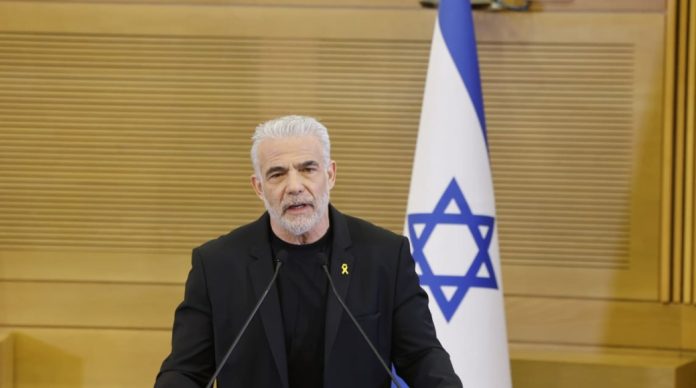Israeli opposition leaders Yair Lapid and Yair Golan called for an immediate end to military operations in Gaza following US President Donald Trump’s announcement of a ceasefire between Israel and Iran.
“Now it’s Gaza. It’s time to finish there too. Bring back the hostages, stop the war. Israel must begin reconstruction,” Lapid said in an official statement.
Yair Golan, head of the Democratic Party, supported this call and added: “The military operation against Iran has achieved strategic success thanks to the strength and unity of Israeli democracy. Now we need to assess the terms of the truce: will it allow Iran to return to its nuclear programme, and what sanctions or actions will be taken if the agreement is violated.”
The opposition representative called on Benjamin Netanyahu to end the war in Gaza, noting that it was time to “end the conflict in Gaza and stop attempts to undermine democracy in Israel.”
New casualties in Gaza
Meanwhile, Israeli forces have killed at least 47 Palestinians in the past 24 hours, with at least 20 of them killed while waiting for help, medical sources said. One child died of severe malnutrition. This came after the Gaza Health Ministry confirmed that since the end of May, at least 450 people have been killed and about 3,500 wounded in Israeli attacks while trying to obtain emergency humanitarian aid.
The ministry’s statement added that most of those killed were near facilities of the US-backed Gaza Humanitarian Fund. According to local sources, about 70 per cent of the telecommunications infrastructure in the southern Gaza Strip was destroyed as a result of IDF strikes. This has led to a virtual communications blackout, seriously hampering the delivery of humanitarian aid, evacuations and the coordination of medical services.
In addition, in areas where humanitarian aid is being distributed, particularly in Khan Younis and Rafah, there have been reports of shooting at civilians, including children waiting for food parcels. In some cases, there have been reports of deaths and injuries. Against the backdrop of the deteriorating humanitarian situation in Gaza, frustration is growing among the population.
Palestinian hopes for a ceasefire
Some residents are expressing hope that the war between Israel and Iran will divert attention from the sector and ease the pressure. At the same time, there is growing concern that the Gaza Strip could be used as a tool in a broader geopolitical game.
“If Iran really wants to stop the war against us, let it do so,” one Gaza resident said. “But if this is a war for Iran’s interests, we will simply pay the price.”
The support for the “Iranian axis” is growing on the streets of cities in the Gaza Strip. Posters with the slogan “From Gaza to Tehran — one front” have been put up in various areas. Local Hamas officials continue to show solidarity with Iran and Lebanon’s Hezbollah as part of the “unification of arenas” strategy developed by the late Hamas leader in Gaza, Yahya Sinwar.
Meanwhile, the situation in the Gaza Strip remains critical, both from a military and humanitarian perspective. Despite global attention to the confrontation between Iran and Israel, fighting in Gaza continues to have a devastating impact on the civilian population and infrastructure, while remaining part of a broader regional conflict configuration.
